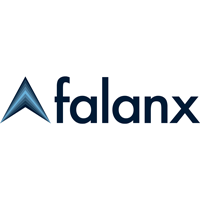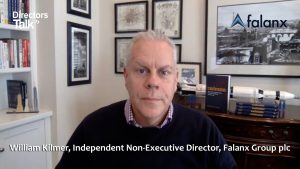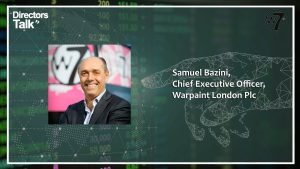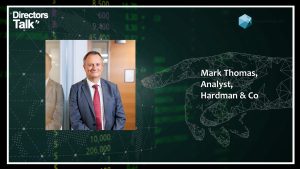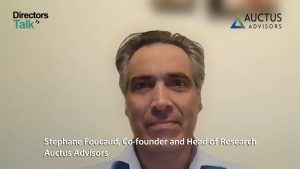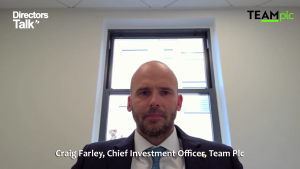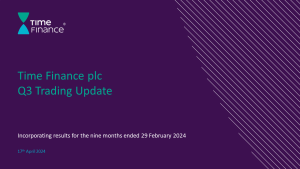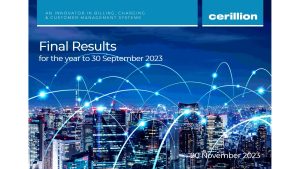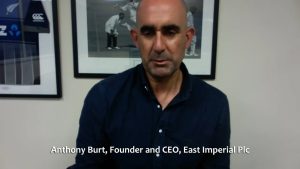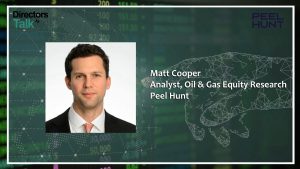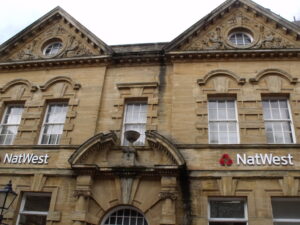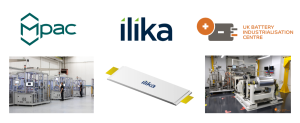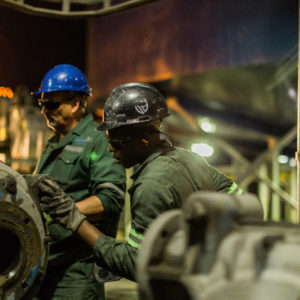Falanx Group Ltd (LON:FLX) Chairman and Chief Executive Officer Mike Read caught up with DirectorsTalk for an exclusive interview to discuss the departure of Stuart Bladen, their business model, MidGARD, company strategy, Mike’s experience with Falanx and previous companies and what specific market factors are driving the business
Q1: We recently note that Stuart Bladen has decided to step down, what were the reasons for his departure?
A1: Sadly, Stuart has left the company for personal reasons. He’s helped guide and steer the business to the interim results which we issued on the 15th November, some of the headlines of which are cyber growth at 40%, revenue growth overall at 18%. We’ll miss Stuart, but we have in place a very strong management team, we’ve got a very clear plan for the future and we’ve got the momentum to get it done.
We wish Stuart all the best for the future and I hope that I can successfully step into his shoes and drive the business to the success that we all require and think we will achieve.
Q2: Do you think it’ll affect the future in any way?
A2: I don’t think it will affect us in a great deal, I think that because we have got that strong team in place and Stuart’s left us with a good business model going forward, it’s just for us to execute it successfully. I hope very confident that with me in the helm for a period of time, we can get that done.
Q3: You refer to the business model, what can you tell me about that?
A3: Yes, certainly. The business model, we’ve got two basic threads so there’s the intelligence side of the business under our Assynt brand, this is a well-recognised and respected geopolitical publication that we issue to 70 customers, covering 35 countries. We report on activities in countries like Syria for example but any major events, we also cover for our customers, these are really subscription based models, so we get recurring revenue from them, but we do do a lot of one-off specials for various customers and we’ve also got imbedded analysts in many companies, both in the UK and the US.
The second thread, which really gains all the attention, is the cyber business, this has got four main components and we call it our 360-degree model. The first part is assessment where we provide tests, this includes penetration testing to identify weak links in a company’s infrastructure. The second part is consult where we help customers understand threats and provide recommendations.The third element is monitor where we provide monitoring activities, 365 days of the year, and this is where we identify real risks in real time and help protect our customers and if, sadly, anybody does get hacked, we’re there to help and guide them in our response time. All these are inter-related and that’s why I call it the 360-degree model, one drives the other and to the other and so, we’re driving our business from this model to profitability.
My main aim is to get more recurring revenue from multi-year contracts on both the cyber and intelligence business.
Q4: How would you describe MidGARD and why is it revolutionary?
A4: We have previously used other software available from other companies to do our monitoring capability and there are a number of these companies out there but, to our mind, none of these really seemed to fit our customer needs, we therefore developed our own advanced threat detection platform called MidGARD.
Why is it special? Well, it uses big data, cloud technologies and other active learning capabilities and we launched this last month at the Ethical Hacking conference. It’s been very well received by the country and it will provide us with good recurring revenue, as I described earlier, but it will also reduce our running costs because we will not have to buy the software from other providers.
Q5: In terms of corporate development, we noticed you’ve been quite acquisitive, what is the strategy going forward?
A5: Yes, Falanx Group have bought, over the last year, a couple of companies really to help us on the cyber side, on the consult so the bit I described earlier where we go in and help people understand what the possible threats are. So, we bought a couple of companies to help us progress that and make that an independent, a separate entity for us to grow so there’s been two acquisitions there.
We bought another companies which has got some interesting intellectual property which has really helped us advance MidGARD and the success of that made it successful that we launched it, as I said earlier, at the conference.
So, going forward, to answer your point, where appropriate we’re still looking for further companies that we can add to our consult and assessment side of the business, I see both of those as on-ramps to our monitoring capability which is where the nice recurring revenue is.
Q6: Just turning to yourself Mike, why did you get involved in Falanx Group in the first place? What’s been your experience for the company so far?
A6: Well, I got involved about 2 years ago and I think it’s really the same reasons I believe that the investors are involved.
First, there’s a great expanding market and sadly, there’s always unrest in the world and cyber-attacks seem to be with us every day.
Secondly, the regulation is pushing us in a direction of a thing called GDPR which is going to be implemented in the next 6 months and if companies don’t apply the GDPR recommendations then their profit is at risk. We’re finding that we’re providing a lot of guidance to people there, I call it the cyber MOT, so many people are coming to talk to us about that.
The other reason I joined was that we’ve got a great product set so our intelligence side, under the product Assynt, and under the cyber side, now we’ve got MidGARD and other good products to help flesh out that part.
The fourth main area is we’ve got a great team, we’ve got some of the leading experts that have joined us so those are the reasons I joined.
I found, being here for 2 years, that all the reasons I joined are actually there, so I’m very pleasantly surprised with everything that’s moving forward as we’ve showed in our interims.
Q7: In terms of your career history, what is it that you bring to the table?
A7: Well, I’ve run a number of companies both in the UK and the US which we’re on the stock exchange so my business experience of dealing with shareholders is an interesting one, certainly dealing with some of those in the US and how they differed here.
I’m pretty good at motivating teams because all the companies I’ve run have been successful and I’ve grown those companies through organic growth, which everyone likes to see, but also inorganic.
So, I’ve undertaken a number of acquisitions over my many years in the business and what’s happened is this has really increased revenue, reduced costs and always leads to solid profit, the last one I did was the AIM-listed company called Pipex.
So, I believe that I always increase shareholder value and give customers what they require.
Q8: What can you tell us about the specific market factors which are driving Falanx Group?
A8: I’ll split it into the two areas, on the intelligence side, our Assynt product, there is always global instability sadly therefore our 70 customers like our reports on 30-odd countries we provide so that’s really driving business, more people are requesting those reports. Also, there’s a real duty of care for the multi-national companies around the world to make sure they look after their staff and therefore they need information to find out exactly what’s going on. The Assynt team, some of them have been around with us for 8 years, are well informed, well respected and they give very reliable information.
On the cyber side, one thing I covered a little earlier, GDPR is driving a lot of business to us, nobody wants to trade with a company that’s not secure, as I said I view that as our cyber MOT. The second one, you hear that there’s daily hacks and more phishing example going on, so people need to protect from that. Te third bit is that the companies’ networks that we’re looking at are getting more and more complex, people have mobile solutions, cloud-based applications, remote storage and all of that leaves possible gaps for hackers to get into people’s networks and disrupt their businesses.
So, they are really what I see as the market factors and the market drivers that we are addressing for all of our customers.

